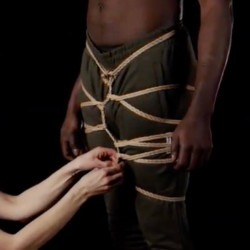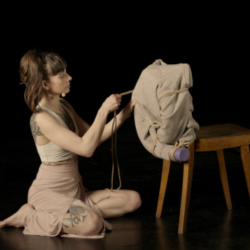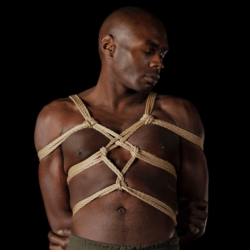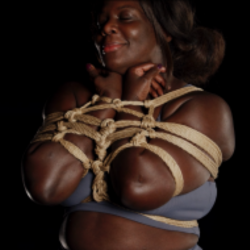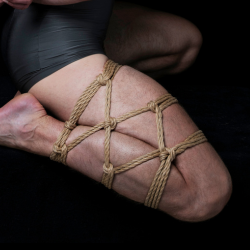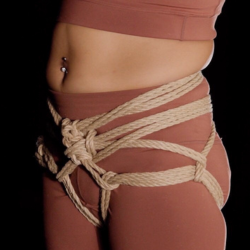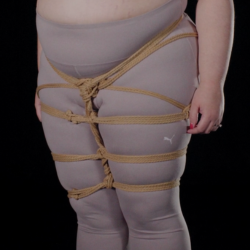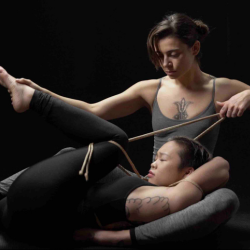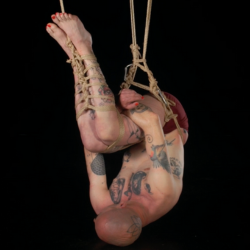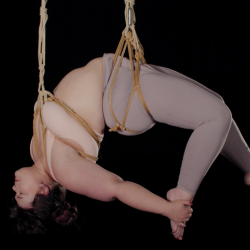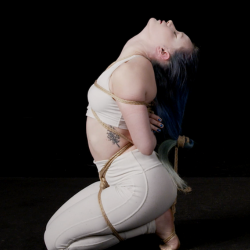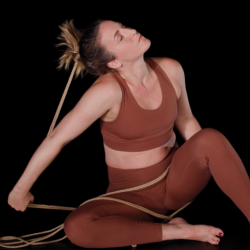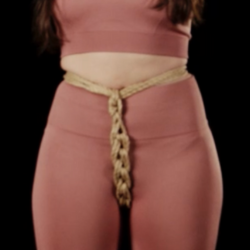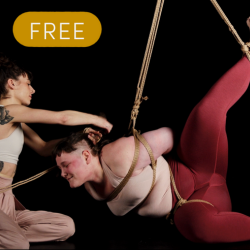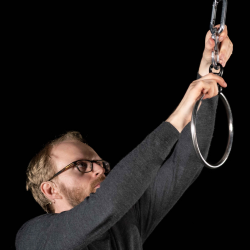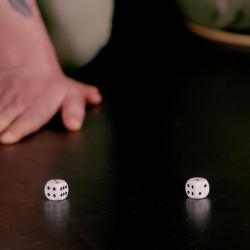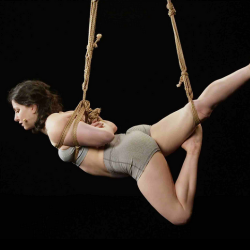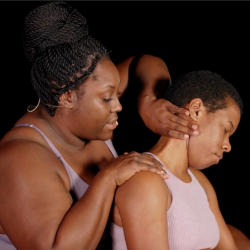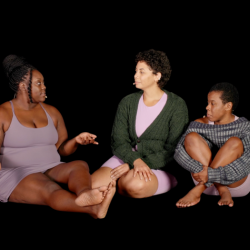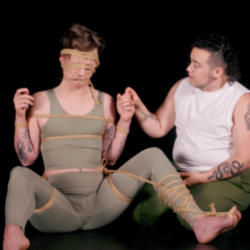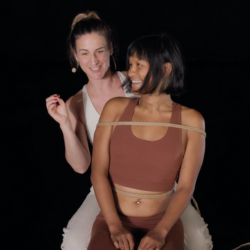EP 05
FUOCO
In this episode, Wren and Fuoco discuss a bottom's responsibility, a community's accountability, and tangible bottoming skills.

Fuoco is a rope educator, circus performer and aerialist. As an educator, her focus is on body mechanics and developing more comprehensive education for rope bottoms.
Wicked Wren [00:00:18] Welcome to the Shibari Study podcast. I'm your host, Wicked Wren. Today I'm joined by the one and only Fuoco. Fuoco's background is extremely fascinating. She's a professional circus performer and has been in the rope scene since 2012. She's a feminist, a performance artist and an educator, to name a few. As an educator, her classes focus on equipping bottoms with tangible teachable skills. She runs an online zine with Gray called Cut the Leash.
Fuoco [00:00:47] Hello. Hi. Okay. Nice introduction.
Wicked Wren [00:00:51] Thank you so much. Well, you are such a multi-skilled human being.
Fuoco [00:00:57] Thank you.
Wicked Wren [00:00:58] You're welcome. So two things really excited me about our interview today. One, I was reminded about the rope bondage drills for the apocalypse you did during COVID, which honestly feels like a different life time.
Fuoco [00:01:13] Oh, my God. Right. I remember being like, Okay. Two weeks of lockdown. 14 Instagram videos to keep people entertained.
Wicked Wren [00:01:23] Yes.
Fuoco [00:01:23] Also like 14 days where I won't be allowed to work and should probably try to make a little bit of extra money.
Wicked Wren [00:01:30] I love it.
Fuoco [00:01:31] Yeah, life changes.
Wicked Wren [00:01:33] Well, it definitely can be engaged during COVID. So thank you so much. I appreciate it.
Fuoco [00:01:39] It kept me engaged. It kept my pretty vanilla roommates engaged.
Wicked Wren [00:01:43] I love it. I also stumbled across your resumé, which is fascinating because most people under additional skills just list excel. But you have fire breathing.
Fuoco [00:01:56] I do breathe fire. You know, I think actually now I have fire eating. I eat fire. So the distinction being that I will put like a flaming torch in my mouth, but I won't hold fuel in my mouth. So when you see people like put a little puff of fire in their mouth and extinguish it, that's what I do. But when people like breathe like a dragon and like this giant flame puffball comes out of their mouth, that's actually, like, real scary. I don't do that.
Wicked Wren [00:02:24] So what is the life of a big professional circus performer?
Fuoco [00:02:28] Nowhere near as glamorous as what anybody thinks it is. I actually am a professional circus performer. I went to school for Circus. I did a three-year full-time program and that was like a life in and of its own, where you're just 8 hours a day training. You're training in your main disciplines. I study aerial hoops and hand-to-hand like I do handstands on other humans. But then I had classes and like handstands and acrobatics and juggling. I'm really bad at juggling. Like my juggling coach fondly refers to me as his greatest disappointment. Oh yeah. At this point now, the life of a professional circus performer having left that is like a balance of taking odd non-circus jobs to make money while also taking like circus jobs that pay the bills but don't make you feel like an artist while also trying to find time to like, do your pull-ups and make your art and like so that you can afford to take the jobs that do make you feel like an artist or, you know, take the jobs or just create the work that makes you feel like an artist. It's all a hustle.
Wicked Wren [00:03:38] And you've talked about being drawn to spaces where performance art and politics intersect.
Fuoco [00:03:43] Yes. Yeah. My master's degree – I came to circus later in life. I've met so many people who started when they were 12 and this is just what they've done for their entire life. But I did my undergraduate and gender studies. I did a master's in human rights. I've been involved in a lot of activism around (…) violence and (…) workers rights for a really long time. More recently, involved in sort of renters organizing and tenants unions. I feel like there is a place in the world for artists who are just making art because art is beautiful and necessary and part of a politics of joy. But personally, like for me to invest in an artistic project for its own value, right? Like not the thing that's going to pay my rent or keep the lights on, but something that is like the art that I care about. I do want that art to be a part of activist projects be like in conversation with movement work. Yeah, this is a really big question. What is–?
Wicked Wren [00:04:46] Yeah, totally. So you have so many varied interests. Like you've said outside your career, you run and write for your zine, you build and teach classes. You're an activist. I'm really curious what a day looks like for you. How do you segment your creative time with the more straightforward time and the more training time?
Fuoco [00:05:05] Yeah, I have tried really hard in my life to actually like – I'm trying right now. I think to deconstruct the notion of career. I just read Work Will Not Love You Back by Sarah Jaffe, and I highly recommend it to anybody who wants to read it. And then if you do read it and want to like slide into my DMS and chat with me about it, I'm all for that. But so that's all I'll just say that like my daily activities fluctuate on a semi-regular basis and there's always in my day something that I'm doing that needs to pay the bills and then something that I'm doing that I think is contributing some good into the world and then something that I'm doing, like for me and my own joy and my own body nourishing all of those things and that fluctuates. So right now I wake up and I work as an editor for a website and I often wake up and train with my acrobatics partner and then do some work for my 9 to 5, which in practice is more like a 10 to 3, and then do something that's maybe a little bit more creative, like working on a zine or most recently in the evenings I've been working on writing this Choose Your Own Adventure book.
Wicked Wren [00:06:21] Yeah.
Fuoco [00:06:22] But all of those things shift. Like sometimes I'm editing a lot less and I'm training circuits a lot more and it's because the circus is going to be paying the bills for the next few months. And in moments when my schedule shifts, I try to make sure that I tend to the other activities too.
Wicked Wren [00:06:39] Do you have any specific structures that you've put in place to keep the other plates spinning while you're working on one?
Fuoco [00:06:47] Absolutely not, no. I think that's a life project. I'm talking about finding this balance but I'm really bad at it.
Wicked Wren [00:06:56] Same and this is a very selfish question because my life is similar when I have all these different things going on and I was curious that you figured it out.
Fuoco [00:07:04] No, I will say that having an organizer and scheduling in my organizer that like on this day I'm actually working on my creative project that I'm not going to book a lesson or I'm not going to like go off and train has been really helpful for me. And then the other thing that I love to do is in the last year or so, started my day with morning pages. Are you familiar with morning pages?
Wicked Wren [00:07:25] Yes, I love them.
Fuoco [00:07:27] Three pages of just like scribbles, a stream of consciousness writing three pages. I find that clearing my brain of that noise creates a lot more space for like, balancing the other things.
Wicked Wren [00:07:43] Agreed. I have a five-minute journal that I used to.
Fuoco [00:07:46] Nice.
Wicked Wren [00:07:47] And I really liked that.
Fuoco [00:07:48] Yeah, it's remarkably helpful. It doesn't sound like it's going to be until you do it and then you're like, This is life-changing.
Wicked Wren [00:07:54] Yes. And in the beginning, it's awful.
Fuoco [00:07:58] Totally. Yeah. I agree.
Wicked Wren [00:08:01] I want to talk a little bit about an essay that you wrote in 2015 and you recently updated it. The essay is called On Bottoming Responsibility. And I would encourage everyone to read it and I'll only get in the show notes below. It's truly amazing.
Fuoco [00:08:16] Thank you.
Wicked Wren [00:08:17] You're welcome. And you essentially say that a bottom's responsibility to injury or incident is equal to the top's responsibility in the situation, and that if a bottom doesn't know that something is wrong and injury occurs, the top definitely didn't know that something was wrong. But the burden of blame generally falls more on the top. And this is due to how we initiate bottoms into the scene.
Fuoco [00:08:41] Yeah. Oh, you're really good at summarizing all of that. That was excellent.
Wicked Wren [00:08:45] You know, it's easy to summarize something that's written super great, you know?
Fuoco [00:08:51] Yeah, I largely still believe this, but every once in a while I have a couple of posts on FL that someone will like or they'll leave crumbs on it. And then suddenly, like, I log in and there's 50 notifications of someone liking it. And I'm like, Oh, do I still like what 2015 Jenna had to say about that? Yeah, you know, like responsibility is a weird word. Responsibility gets coded for like blame, especially when we're thinking about injury and when we're thinking about injury as sort of failure. And we do think about injuries as failure because we expect a sort of clean track record from the people that we play with to feel confident in their abilities, which is its own problem. So yeah, I do wish that we – and I think that we're moving towards things that were really, really present in communities when I wrote that was I would meet tops and riggers who were introducing new bottoms into the scene, talking to them about rope as this sort of like transcendental experience where like you're going to go into subspace and leave this planet, shoot off to the stars and I'm going to take your life into my hands. And that is the appeal of this thing that we do together. That dynamic is what makes rope so intriguing. And I find all of that to be immensely icky and–
Wicked Wren [00:10:11] Be real with your fantasies.
Fuoco [00:10:11] Yeah, and I will say that I don't think that descriptor of like – I think that we've come so far in terms of bottoming education and just rope being a lot more visible and different ways of doing rope being a lot more visible that I don't think that that discourse is so prevalent. And I do think that we've also come a lot farther in sort of valuing people who can say like, Oh, I made this mistake and I learn from this mistake and here's how I've learned and grown from this mistake. Whereas in 2015, like causing injury or experiencing injury, like there was just a lot more shame around all of it.
Wicked Wren [00:10:48] Totally.
Fuoco [00:10:49] Yeah. Actually, let me say one more thing about that writing because this is the thing that really irks me when this writing like, pops back up and goes viral again. I don't really want to amend the writing. I'm like, happy for it to be a relic of my thinking at the time. But I receive some criticism or critique of the writing where someone – I don't know if they used the word neoliberal, but if they didn't it was implied or maybe we talked about it in a message exchange after the fact, and I really took it to heart. Also, at the core of that writing is this idea that you can sort of like hyper-optimize yourself as a bottom to like mitigate risk and that this hyper-optimization seems to happen very much so at the individual level. And what I would love to add to that writing or just to like the thought and the discussion around it is like a lot of the responsibility towards risk mitigation can also happen at the community level. And so like a lot of our responsibilities as individuals are to like participate in community and a lot of our responsibilities as community is to fold individuals in ways that like make education more accessible and make vetting more accessible and your capacity to do all of these body checks and mental checks is bolstered by your capacity to, like, trust the people that you're sharing space with.
Wicked Wren [00:12:11] You even said in the essay, Imagine if the community as a whole was as nervous as bottoms jumping into suspension as they were about riggers suspending people. So, I mean, it's a community issue. It's not just bottoms because like you said, we romanticize the idea of someone taking us into this different place. You don't have the tools to even audit that experience if it's healthy or not.
Fuoco [00:12:37] Totally. Auditing is a great way and you have the tools in your own body and they're like educational resources available to you as a bottom to help you make decisions in the moment about like how things are feeling for you, how your interpersonal interaction is going, like how you're choosing or deciding to manage your headspace in that moment of being in rope and all of these things. There are things that can help keep you safe. If bottoms knew from the get-go that those resources that the education was available, that that level of self-knowledge was in the way that rigger know, here's a checklist of things that I need to learn before I can safely suspend someone. Like there is a similar sort of checklist of things, skill sets that bottoms can develop that will help them feel more confident in their abilities in rope and like, not their abilities to achieve some crazy position or endure a suspension for a long time. But just their ability to discern who is the right rope partner for them, their ability to discern if what's happening in the moment is something that they are able and happy to sink in to or something that they need to zoom out of and talk about.
Wicked Wren [00:13:47] Yes, I feel like teaching bottoms the correct questions to ask would be a really good thing.
Fuoco [00:13:54] Yeah. Well, and I also think that like, that's going to show up really differently from community to community. And so I think that there's a whole variety of skill sets too that we can – and maybe this is part of what I'm getting at when I talk about community. Like there's this checklist that I just reference. There are these skill sets that we construct and name and maybe develop pedagogy around. Largely to protect people from the reality that many of us do rope with strangers or in communities with people who are not necessarily vested in our well-being. And I guess that's maybe more what I'm trying to get at when I talk about neoliberalism, right, is there's like another world. Not just where like community says, like, Oh, here's your checklists. I'm skeptical of you, too, because you haven't gone through your checklist. But a community where, like, we don't necessarily have to, like, know all the right questions or be experts at negotiation because there's a cultural change in how much we expect to establish trust between people.
Wicked Wren [00:14:56] I don't really love the word community, honestly. And yet you wrote another amazing essay called We're Not Ready for Accountability, and I'll link it again. And in that, you said, our community is woefully unequipped to actually succeed at accountability. We're a group of people who often see each other as more of commodities, people whose time, bodies and skills satisfy our (…). We don't really have a framework to talk about community outside of going to the same events, but this is where community ends and it's likely that our definition of community is void of the sort of care required to make this work. And that is so true because the word community kind of gaslights us into thinking there are more structures in place to keep us safe.
Fuoco [00:15:42] Yeah, absolutely. I mean, these essays, I don't think that I've talked about them in such close succession with each other. But they are really or rather, at least the conversation we're having right now around these two essays is the same one. I completely agree with you. Our sense of community is the way that the word is used is gaslighting. Absolutely. And I'm definitely not the only person to have raised skepticism about the word community. And I think actually nowadays this skepticism is maybe more commonplace than not, or this critique is more mainstream than not. But I don't see the necessary conclusions that I think should follow that critique being implemented, which is, okay, we've identified that our quote-unquote community does not actually function as community in the way that we would need it to if we were talking about it in terms of accountability and repairing harm.
Wicked Wren [00:16:39] Exactly.
Fuoco [00:16:40] And accountability and transformative justice practices are like their generative practices, their practices of building their practices of replacing carceral systems and punitive systems. And we as a – no one can see my air quotes. But as I continue to use the word community, you can sense that it's an air quote. We as a community really invested in transformative justice for its capacity to help us, not ban people. We're really interested in transformative justice as a mechanism for repairing harm, which makes sense because a lot of harm happens in our communities. But I think we're less interested in the lessons of transformative justice around, like what it would mean to build actual true, not in air quotes, community – like the building, the generation. In order to replace and overthrow carceral and punitive systems, that tremendous amount of trust and care needs to be infused into spaces where it is not been. And there are a lot of really, really valid reasons why it's hard to infuse trust and care into community like capitalism and the demands of all of our working lives and the scarcity that we all experience make that really, really hard. And also just the way that rope spaces are run, right. At the end of the day, somebody in your community pays rent on a space and has to make hard choices about how or how not to believe survivors and how – people who have been harmed and like what sort of policies to implement about banning people. And these questions directly interface with their own ability to pay the bills and to keep the lights on. So I think that the lessons of transformative justice actually push us away from like right now in this moment, figuring out how we necessarily even like repair harm at a community level or how we sort of rehabilitate. That's the wrong word. But like how we support people who have consistently caused harm. Like I think that the lessons of transformative justice should actually be pushing us in the direction of how do we form worker-owned cooperative rope spaces, how do we make it such that any person who enters community with us is also aware of the values of those communities is signing on to those values. Like how do we create spaces that are financially sound enough or well-resourced enough that we can both sell tickets to rope education while at the same time be able to offer spaces like book clubs and potlucks and like doing the actual work of community building and that prerequisite to any of the harm repair that we're so interested in.
Wicked Wren [00:19:19] Yeah, it would be easy if people said, I want to harm you and then they did it. It's a very binary thing, but it's hard because most people don't mean to cause harm.
Fuoco [00:19:31] Yeah.
Wicked Wren [00:19:31] You also said rehabilitate, which I think is a great word because when you just cast someone out, they just find a different community to offend. And it is a lot of rehabilitation of saying that didn't go great. This is what should have happened, you know.
Fuoco [00:19:47] And it's like it's a collective rehabilitation, too, though. I think the reason I shied away from that word is because it assumes that are sort of people who know more, who can like pick you.
Wicked Wren [00:19:58] Definitely.
Fuoco [00:19:58] And show you the light as opposed to just sort of like we're all unlearning systems of oppression and we're all unlearning forces that have hurt us and that push us into harm. So like we are rehabilitating our community members alongside the work that we are doing for ourselves and the rehabilitation of all of ourselves to resist this world we live in.
Wicked Wren [00:20:20] Absolutely. So I want to talk a little bit about bottoming from a physical aspect since we talk so much about the mental and emotional side.
Fuoco [00:20:29] Yeah.
Wicked Wren [00:20:29] And I have a couple things I want to hit on. I'm a person – I've always been very physical, so when I came into rope, I thought that I knew more than I did know about my body, if that makes sense. And that was very difficult for me to unlearn. And I'm still trying to figure out what feels really good in the box tie for me. Things like that.
Fuoco [00:20:50] Maybe the thing that has been most helpful for me in shifting my expectations of my like physical self in rope is I've gotten over the idea that rope is inherently good for my body or that my athleticism will serve me in rope. I think back to my early days in the bondage scene and people were talking about training for rope, or how the fact that I studied circus was such a boon to myself as a bottom. And I think because of that and I wonder if you relate to this experience, like I think folks who come into rope with movement practice and with attunement to their bodies expect that rope will feel like another movement practice. Expect that it will feel sort of like differently nourishing but still nourishing to their bodies. And so like actually what I've landed on that makes sense for me is like rope is not inherently nourishing to my body. Like, rope is like spiritually nourishing to me. Rope is interpersonally nourishing to me. And I put my body through a bit of (…) to experience the like things about rope that are nourishing. But so that that was really helpful. Like changing my perspective from like what is like the best way to like, actively bottom through this? How does my athleticism support me here to sort of – what's the sweet spot of like not putting my body through too much (…) while still getting all of the like emotional benefits that I'm here for.
Wicked Wren [00:22:17] For the happy chemicals and stuff.
Fuoco [00:22:19] Yeah, that makes sense.
Wicked Wren [00:22:23] Something that I've heard you talk a little bit about is core support in rope. When to use it, when not to use it.
Fuoco [00:22:30] Yeah, there is like a somewhat easy answer to this I think. Or for me, like the easy answer is when your spine feels compromised, like there are a lot of moments where in rope we move past a range of like all of our joints have ranges of passive and active flexibility. And what that means is that like my ability to move my joints through range of motion is less than your ability to move my same joints through a range of motion, right? Like I can lift my leg to a certain extent, but if you were physically manipulating my leg, you can move it farther. And so most rope happens in our passive ranges. Most of the ties and the positions that we experience – at least most of the times that we feel like really, really tightly bound or perhaps even like a little bit compromised. Part of what we're experiencing is just that we're like outside of our range of motion that we can support. This is part of, I think, discerning like what is the right amount of (…) that I will take for my body to –
Wicked Wren [00:23:31] Absolutely.
Fuoco [00:23:31] The right amount of (…) that I will put it through. And then so within that, being in your passive range can feel like an activation through your tendons or ligaments. Like you feel like you're hanging through connective tissue rather than hanging through muscular support. And I get particularly worried about this when I feel this in my spine or when I'm experiencing like that sensation, like your core protects your spine and it can protect your spine inflection and extension and twisting. And so find yourself in moments where your spine feels like it's moved past a range that is good. A bit, of course, support can be helpful. Learning about your core is like its own weird, lifelong journey. Like I feel like I'm constantly finding more. More of my insides.
Wicked Wren [00:24:21] I wanted to talk a little bit about teaching tangible bottoming skills, because I think a lot of the bottoming education is very esoteric. It's very conceptual. But you talk about teaching tangible things. What are some tangible things that bottoms can take from this or educators can add to their toolbox maybe?
Fuoco [00:24:40] Sure. So tangible things that I like to teach are how do you more accurately assign language to the sensations you're feeling to be able to communicate more effectively with people who are tying you. Not tangible in the sense that you can like touch it, but tangible in the sense that it's not an esoteric skill.
Wicked Wren [00:25:00] Well, it's actionable.
Fuoco [00:25:01] Yeah, absolutely.
Wicked Wren [00:25:03] I think it's huge.
Fuoco [00:25:04] Yeah. My specialty in my sort of niche is about like, I know a lot about bodies. I know a lot about how bodies work. And for me, my own process of learning about my body has happened in combination. There's been a multitude of inputs that have helped me gain a knowledge of my body. And some of those inputs have been doing and feeling, and some of those inputs have been like actual study of anatomy and looking at skeletons and looking at joints and naming muscles, doing sort of targeted exercises to feel specific muscles, and then putting those muscles in the context of a certain sort of movement pattern. And so that's a lot of the tangible skills that I teach bottoms as well. Like when we're in a box tie, we're in internal rotation. What are the muscles that contribute to internal rotation? How do you feel if they're turned on? How do you feel if they're in stretch? What does it mean to you in terms of how rope should be laid on your body when you feel one thing or another? I think that for a long time, bottoming education sort of took the form of the rope bottoms roundtable, which is a very important and validating format. And I think just sharing your experiences with others and hearing that they have similar experiences can also be really, really helpful. But there are other skills that we can be teaching.
Wicked Wren [00:26:20] And speaking of box ties, you're writing a Choose Your Own Adventure book about box ties, right?
Fuoco [00:26:25] I am. It's so close to being done. I'm so excited.
Wicked Wren [00:26:29] Yeah, I can't wait.
Fuoco [00:26:31] Okay, so here's my mini rant on this.
Wicked Wren [00:26:35] Let me hear.
Fuoco [00:26:36] All of our rope teaching, even in classes where we say, You must come partnered. We're going to teach to tops and bottoms. The way that we teach people to do rope is very rigger-centric. When you walk into a box-tie class, what someone will be taught is the harness that that instructor thinks is going to make that rigger, like most likely to have success with the most number of bodies. And then if you are one of the bottoms who has a body, you know, one of the 75% of bodies that is suited to that box tie, like that'll be okay for you. But if you're a bottom, who actually needs to be tied in a really different way or whose body suggests a different sort of harness, you'll be left behind. And maybe the fact that like your specific anatomy would be better suited to a different sort of box tie will be like named by your teacher. Hopefully, it will. Hopefully, you're pointed to somebody else who can teach you and your rigger a better harness for you. I dream of a day where we start teaching box tie from the perspective of, If shoulders do this, then apply the first wrap like that. And if shoulders do this, then the first wrap could go on like this. And that's like sort of what I'm trying to do with this Choose Your Own Adventure book. It's like a giant project and as I write it, I have to keep being like, You can't do everything in this single zine that your self-producing, Jenna. Slow your roll. But hopefully what it does, like hopefully somebody who buys the book will get to choose their own adventure. They'll get to start from a place of like, How does my body work? What does my body need? What do those things suggest about what sort of like rope application would be best over top of my anatomical form? And then like, necessarily like, okay, well, what are the names of the box ties that most closely approximate that? Because that's the sort of shared language we have right now for box ties. And no, having access to that language will be helpful for somebody who's trying to seek out a specific sort of form. But yeah, I would love to move away from like the OS box tie or the Naka box tie. You know, like, no shade to Naka. Sorry, Naka.
Wicked Wren [00:28:57] You heard it here folks.
Fuoco [00:28:57] Oh, my gosh. No, no shade to Naka. But, yeah, I've got to move away from, like, learning these sort of, like, named harnesses and patterns as the way that we start to teach people to tie and actually just teach people to tie on bodies.
Wicked Wren [00:29:12] Well, it sounds like our next podcast is going to be all about box ties.
Fuoco [00:29:16] Yeah, probably. And I just want to say too I am also totally here for the bottom, who is utterly disinterested in box ties. I think that's rad. There's like a tiny, teensy little section of the book that talks about folks who just don't want to be in box, but maybe do want to feel loads supported across their arms instead of just across their chests and sort of how you can achieve that without just defaulting back to a chest harness.
Wicked Wren [00:29:43] I look forward to your book. You're on Instagram @fuocofet and on FL @Fuoco.
Fuoco [00:29:52] Thought I'm like very rarely on FL. So if anyone wants to reach out or please reach out. Like I'm happy to chat with people and anybody who–
Wicked Wren [00:30:02] Yeah, you seem nice.
Fuoco [00:30:03] I think I'm nice.
Wicked Wren [00:30:04] Yeah.
Fuoco [00:30:05] Anyone who wants to get in touch, should get in touch with me on Instagram. It's much better.
Wicked Wren [00:30:09] And you also have a Patreon. It's https://www.patreon.com/jenncio.
Fuoco [00:30:13] Oh, yeah. And it's really new. It's largely sort of like public-facing geared towards the circus community. However, all of the benefits of that Patreon can be transferred to rope folks. There's like pretty big discounts on private lessons and I'm happy for those private lessons to be rope-focused and not just circus-focused. Even though the language of the Patreon doesn't necessarily say that explicitly.
Wicked Wren [00:30:37] Beautiful. I'm also going to steal the phrase rope folks. It's great. It just rolls off the tongue.
Fuoco [00:30:43] It does.
Wicked Wren [00:30:44] Well, I want to thank you for being here. You're amazing. And I look forward to talking to you soon.
Fuoco [00:30:50] Yeah, you too. Thank you so much.
Wicked Wren [00:30:52] You're welcome.
Start your free 7-day trial
Get one free week of unlimited access at Shibari Study,
then pay from $17.90/month. Cancel anytime.


